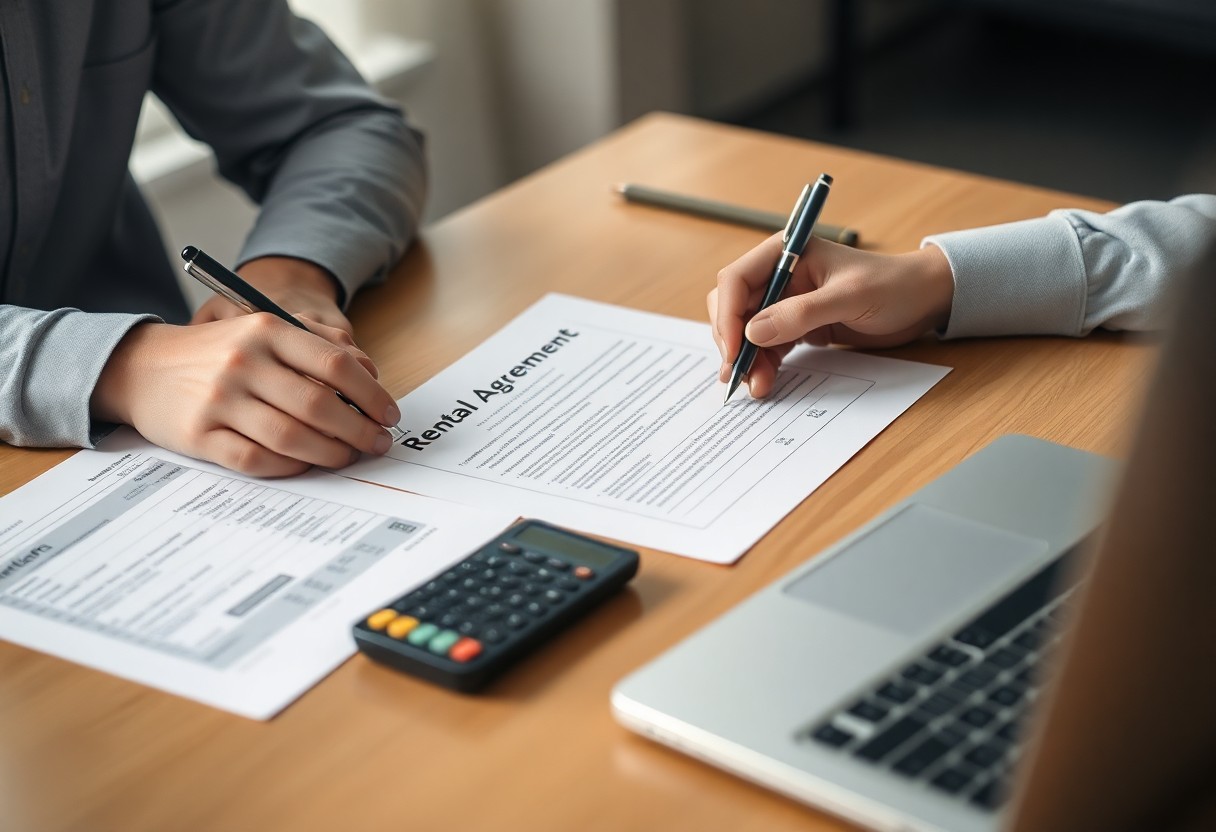There’s a lot to consider before you sign a rental agreement that could impact your living situation significantly. It’s vital to understand the terms and conditions of your lease, including your rights and responsibilities as a tenant. You should also pay attention to hidden fees, the length of the lease, and any policies regarding security deposits. By familiarizing yourself with these key aspects, you can make an informed decision that protects your interests and ensures a positive rental experience.

Key Takeaways:
- Review the Rental Agreement: Carefully read through the entire contract for terms, conditions, and policies to ensure you understand your obligations.
- Check for Additional Costs: Look for hidden fees such as maintenance charges, utilities, and parking fees that may not be included in the rent.
- Understand the Lease Duration: Be aware of the length of the lease and the terms for renewing or terminating the agreement if needed.
- Know the Security Deposit Terms: Understand the amount required for the security deposit, the conditions for its return, and any deductions that may occur.
- Assess Pet Policies: If you have pets, verify if they are allowed in the rental property and if there are any additional fees or restrictions.
- Clarify Maintenance Responsibilities: Identify who is responsible for maintenance and repairs, and the process for reporting issues during your tenancy.
- Research the Neighborhood: Investigate the location and surrounding community to ensure it meets your lifestyle and safety expectations.
Understanding the Rental Agreement
The rental agreement is a binding legal document that outlines the terms and conditions of your tenancy. It’s vital to thoroughly read and understand this agreement to ensure that both you and the landlord have clear expectations throughout the rental period. This knowledge can prevent misunderstandings, protect your rights, and help you make informed decisions regarding your living situation.
Key Terms Explained
Explained in simple terms, key elements of a rental agreement include the rent amount, payment due dates, security deposit requirements, and rules regarding property maintenance. Being familiar with these terms will enable you to navigate your lease with confidence and foster a positive relationship with your landlord.
Length of the Lease
Explained, the length of the lease refers to the duration for which you agree to rent the property, commonly set for one year. Understanding this timeline is vital as it affects your commitment to the rental property and your ability to make changes to your living situation.
Hence, the length of your lease can have significant implications for your housing stability and financial planning. A fixed-term lease typically locks you in for a specified period, providing predictability in your rental payments. On the other hand, a month-to-month lease offers more flexibility, allowing you to move with shorter notice. However, this may come with higher monthly rates or less security in tenure. Ensure you evaluate your personal situation to select the most appropriate lease length for your needs.

Security Deposits
While securing a rental property, understanding the implications of the security deposit is imperative for you as a tenant. This upfront payment acts as a financial safeguard for the landlord, covering potential damages or unpaid rent, and it is typically refundable if you meet certain criteria by the end of your lease.
Amount and Purpose
Along with the security deposit amount, which often ranges from one to two months’ rent, it serves the vital purpose of protecting the landlord against any damages or rent defaults that may occur during your tenancy.
Conditions for Return
Amount of your security deposit will be returned if you leave the property in good condition, but be aware that landlords may withhold your deposit for specific reasons.
Another important aspect to consider is that landlords will usually deduct costs for uncovered damages beyond normal wear and tear, unpaid rent, or cleaning fees. To protect your deposit, it is advisable to document the property’s condition upon moving in and out, ensuring that you provide evidence if a dispute arises. Moreover, familiarize yourself with your state’s regulations on security deposits, as they will dictate how soon you can expect your deposit back after moving out.
Responsibilities of Tenants
Keep in mind that signing a rental agreement comes with specific responsibilities. You are expected to maintain the property in good condition and adhere to the terms outlined in the lease. For more insights, refer to Things to Consider Before Signing a Lease.
Maintenance Obligations
Any issues that arise with the rental property should be reported immediately to your landlord. Timely communication can prevent small problems from escalating into larger, more expensive repairs. It is typically your responsibility to keep the premises clean and free of damage.
Utility Payments
Tenants are often responsible for paying utilities, which can include electricity, water, gas, and internet services. You should clarify which utilities you are responsible for before signing the lease to avoid misunderstandings.
For instance, if your rental agreement states that you must pay for electricity and water, failing to do so may result in late fees or even eviction. Additionally, understanding the average costs of these utilities in your area can help you budget accordingly. Be proactive in managing these payments to ensure peace of mind throughout your tenancy.
Rights of Tenants
Unlike homeowners, tenants enjoy specific rights that protect them in a rental arrangement. These include the right to live in a safe and habitable environment, the right to receive proper notice before eviction, and the right to privacy within their rented space. Knowing your rights helps ensure that you are treated fairly throughout your tenancy and that your living conditions meet legal standards.
Privacy and Entry Rights
On entering a rental agreement, you have the right to privacy in your home. Landlords typically must provide reasonable notice, usually 24 to 48 hours, before entering your unit, except in emergencies. Understanding these privacy laws safeguards your living experience from unwarranted intrusions.
Anti-Discrimination Laws
Among the imperative tenant rights are protections against discrimination. Federal and state laws prevent landlords from discriminating based on race, color, religion, sex, national origin, familial status, or disability. This means you can secure a rental without facing unfair treatment based on personal characteristics.
Plus, it’s important to understand that many states have expanded anti-discrimination laws to include sexual orientation, gender identity, and even source of income. When seeking a rental, you are entitled to equal treatment, and if you suspect discrimination, you can file a complaint with local or state agencies. Knowing the specifics of these laws grants you a greater sense of security in your housing search and ensures that you can advocate for your rights when necessary.
Breaking the Lease
Now, understanding the process of breaking a lease is necessary for any tenant. Life can be unpredictable, and sometimes circumstances necessitate breaking a rental agreement. You should know that this action can have legal and financial implications that vary depending on your lease’s terms and your landlord’s policies.
Common Reasons
Against the backdrop of life changes, tenants often need to break leases due to job relocations, family issues, medical emergencies, or simply finding a more suitable living arrangement. Each of these reasons can affect how your landlord may respond to your notice and the potential penalties.
Penalties and Consequences
Lease agreements typically outline penalties for breaking the lease, which can include losing your security deposit or being held responsible for rent until the unit is re-leased.
But the penalties can extend beyond just financial loss. Many landlords may pursue legal action to collect unpaid rent, which could negatively impact your credit score. Additionally, if you break the lease without a valid reason, you may find it difficult to secure a new rental in the future, as you could be labeled a risky tenant. Always review your agreement and communicate openly with your landlord to explore possible solutions.

Negotiating the Agreement
For many renters, negotiating the rental agreement can significantly affect their living experience. You should approach this process with confidence and a clear set of priorities. Don’t hesitate to discuss terms that may not suit your needs or to ask for adjustments that could benefit your situation, creating a more favorable environment for both you and the landlord.
Areas for Negotiation
Negotiating the terms of your rental agreement may cover several key aspects. Areas worth discussing include rent amount, security deposit, lease duration, and maintenance responsibilities. You can also address utilities that may or may not be included in the rent. Discussing these elements can lead to a better living arrangement.
Effective Communication Tips
On your path to a successful negotiation, effective communication is imperative for conveying your needs and concerns. Start by being clear and direct about what you want and why it matters to you. Use active listening techniques to show that you value the landlord’s perspective as well. Maintain a polite and respectful tone throughout your discussions. Consider these tips:
- Be prepared with specific examples to support your requests.
- Keep the conversation professional and focused.
- Practice active listening to build rapport.
This approach fosters a positive environment from which you can reach mutual agreements.
Agreement is key—effective communication will help you build a good relationship. Additionally, stay open to compromises while firmly asserting your needs. This attitude not only aids in the negotiation process but also establishes a foundation of trust with your potential landlord. Don’t underestimate the importance of clear conversations to convey your desires, ensuring you feel comfortable and secure in your rental choice.
Conclusion
On the whole, before you sign a rental agreement, it’s vital to thoroughly review the lease terms, understand your rights and responsibilities, and clarify any ambiguities with the landlord. Pay attention to details such as rent due dates, property maintenance obligations, and early termination clauses. Being informed helps protect you against future disputes and ensures a smoother rental experience. Ultimately, taking these steps will empower you to make confident choices that best suit your living situation.
FAQ
Q: What is a rental agreement?
A: A rental agreement is a legally binding contract between a landlord and a tenant that outlines the terms and conditions under which a tenant is allowed to occupy a rental property. It includes details like the duration of the rental, rent amount, payment due dates, maintenance responsibilities, and other important stipulations.
Q: What are the key terms I should look for in a rental agreement?
A: Key terms to review in a rental agreement include the rent amount, security deposit requirements, lease duration, conditions for renewal or termination, maintenance responsibilities, and pet policies. It’s also important to check for clauses regarding eviction procedures and any restrictions on alterations to the property.
Q: Are there any fees I should be aware of before signing?
A: Yes, before signing a rental agreement, inquire about any additional fees that may apply. This can include application fees, security deposits, move-in fees, utility costs, and monthly service charges, such as those for parking or amenities. Understanding these fees will help you better budget your living expenses.
Q: What happens if I need to break the lease early?
A: The rental agreement typically outlines the procedure for breaking the lease early. There may be specific penalties or fees associated with early termination, and it’s important to know whether you need to provide notice and how much notice is required. Some agreements may allow for subletting or finding a replacement tenant, so be sure to understand your options.
Q: What is a security deposit and how is it managed?
A: A security deposit is an amount of money collected by the landlord at the start of the lease to cover potential damages or unpaid rent. The agreement should specify the amount, conditions under which deductions may be made, and the process for returning the deposit at the end of the lease. Familiarizing yourself with local laws regarding security deposits can provide additional clarity.
Q: Can I make alterations to the rental property?
A: Most rental agreements include clauses regarding alterations to the property. These may specify whether you can repaint, install shelves, or make other changes. It’s important to obtain written permission from the landlord before making any alterations to avoid any potential disputes at the end of your tenancy.
Q: What should I do if I have concerns about the rental agreement?
A: If you have concerns about any aspect of the rental agreement, communicate with the landlord or property manager for clarification. It may also be beneficial to consult with a legal professional or a tenants’ rights organization to ensure you fully understand your rights and obligations before signing the document.
